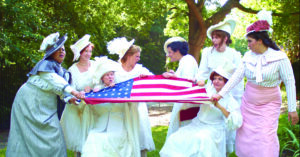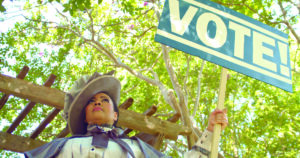By Shari Goldstein Stern
Who knew that 100 years later, after a lengthy fight with the government over women’s right to be heard, to express opinions, to collaborate with those having different experiences and to have a say in electing officials, women would still be fighting for their rights? The passing of the 19th Amendment guaranteed women’s “right” to vote for public officials.

Photos courtesy of Zoe Kerr
The context has changed during the century, but the issue of equality remains the same: In today’s world, the “fairer sex” is forced to fight for equality in women’s right to procreate or not.
Should each woman have the right to make decisions for herself concerning her own body and family? Women have been restricted to who “can” or “cannot” have a say.
Now playing live through October 9 at the Bath House Cultural Center, and streaming October 10-17 is Echo Theatre’s “It’s My Party,” written by Ann Timmons and directed by Caroline Hamilton.
Based on true characters of the time, the eight-women ensemble is dressed in steal-the-show costumes that take your breath away. The wardrobe is a story in itself.
Marty Van Kleeck, who retired last year as manager of the Bath House Cultural Center, designed the remarkable “It’s My Party” costumes that virtually upstaged every scene. Van Kleeck gave us some inside background on its history and how she made it work:
The dresses are created using bed sheets, bedspreads, vintage linens and table cloths. Those were procured from Van Kleeck’s friend, Ronnie Claire Edwards, who is known for her starring role in “The Waltons.” Other fabrics, lace and trim were from Van Kleeck’s own collection and include modern table clothes, drapes, a mattress cover, chair covers, shower curtains and bits and pieces she has collected thorughout the years.
Van Kleeck explained: “The concept was to take all of the items used in women’s domestic work in the early 1900’s and make them into clothes that would become their armor in the battle for a woman’s right to vote.”
She added that the silhouette of the costumes was in keeping with the period but she gave them clean lines to give them a modern edge. “The author does the same with the language in the script,” Van Kleeck added. “If you examine the costumes you can see the top decorated edge of the bed sheet or the loops to hang shower curtains or drapes. I didn’t make any attempt to hide the materials used.”
The designer clarified how the costumes are used to tell a story. “The play starts in 1918 and then moves back in time. Suffragists wore white to stand out in a crowd and to symbolize the virtue they would bring to public life.”
“When the play goes back in time,” the designer continued, “I moved the actresses into color; a different color for each character. I thought that in a play with eight women, color would help clarify the action; give each actress her own color.”

They could then just add or take away pieces like aprons, vests, pinafores or shawls to help signify the passage of time.
Van Kleeck pointed out that as the play moves forward, each character moves toward white until the end when all are in white accept Ida and Winnifred. She pointed out Ida moves to a lighter grey, but because Negro women were not included in the amendment, she never moves to complete white. Winnifred is part of the press and needed to be neutral, but she moves to a lighter peach colored outfit because she indeed did support the movement for a woman’s right to vote.
Wearing the spectacular, custom-made costumes are Dallas actors Caitlin Chapa, Mandy Reichelt, Megan Haratine, Cindee Mayfield, Alysia Giakoumas, Octavia Y. Thomas, Leslie Patrick and Lindsay Hayward. Combined, they have credits with most area theaters, including Theatre Three, Uptown Players, Pegasus, Garland Summer Musicals and more.
Two sides of the movement have different approaches to achieving their mutual goal, and they aren’t happy with each other because of it. A liberal group of Suffragettes thinks taking to the streets with picket signs and making lots of noise is the way to reach equality — not unlike today’s news.
“The other side” of Suffragettes try working side-by-side with members of the legislature and their wives or with their own husbands to bring more personal pleas. Based on real, historical figures, the play is filled with hunger strikes, beatings and bombings. The messy backstory of the 19th Amendment is rolled out in the colors of Suffragettes. When “Negro women” start a movement for inclusion in the Suffragette’s work, they are met with a little compassion, and a lot of hate. That ugly aspect of American culture hasn’t changed much, either.
For tickets and information, visit echotheatre.org.
